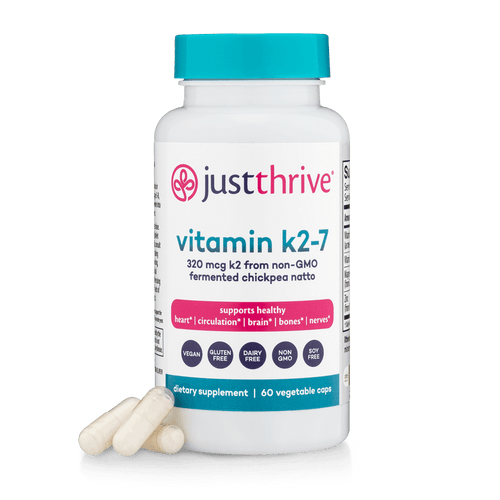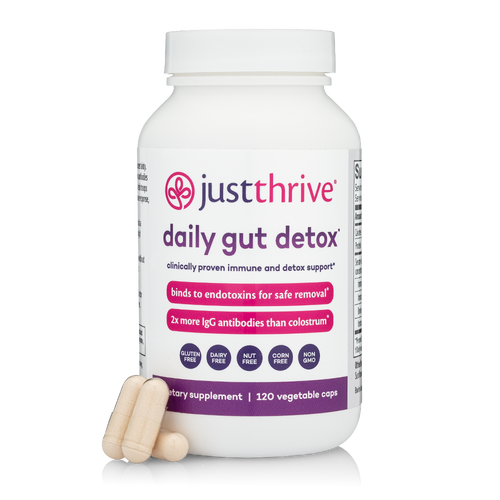Here’s what you need to know before you buy
There’s a new trend in gut health: Synbiotics. These combo products include probiotics and prebiotics, both foundational for a healthy gut microbiome.
The idea is that the combination makes the individual ingredients work better. And that you’ll have fewer supplements to take.
Sounds like a great idea…
But just because two products are used similarly doesn’t mean they’re a perfect pairing. Like shampoo plus conditioner. Or combination washer-dryers. The standalone products just work better.
As for synbiotics? Let’s take a closer look.
What Is a Synbiotic?
A synbiotic is a supplement that includes both probiotics and prebiotics in a single capsule. The theory is that including prebiotics in with the probiotics offers your gut the benefits of both at once.[1]
Another supposed benefit: Combining the two gives the probiotics a better shot at survival. And since most commercial probiotics die off before they ever get to your gut, this strategy could help change that. At least in theory.
But a lot depends on exactly what’s in the capsule.
There are two main kinds of synbiotics: complementary and synergistic.[2]
Complementary synbiotics dominate the field. This is a combination of probiotics and prebiotics that work well independently and hopefully work well together.
Synergistic synbiotics, much rarer (at least so far) try to include prebiotics that are known to support the particular probiotics.
Either way, the point is for everything in the capsule to work at least as well in the gut as if they’d been taken separately. And hopefully even more effectively.

Why You Need Both Probiotics AND Prebiotics
Your gut microbiome contains trillions of bacteria. In a healthy gut, a diverse population of beneficial probiotic bacteria vastly outnumbers harmful pathogens.
But when the gut becomes imbalanced, pathogens overgrow and dominate, a condition called dysbiosis. They interfere with all of the benefits of probiotic bacteria, and at the same time damage your health. The longer your gut stays out of balance, the higher your risk of developing chronic illnesses.
To keep beneficial bacteria in control, your gut microbiome needs constant support. That comes in the form of supplemental probiotics and prebiotics.
Probiotic supplements help create a positive environment for a variety of beneficial bacteria in your gut.
Prebiotics nourish probiotics, providing them with their favorite food.
That’s why your gut needs both probiotics and prebiotics to stay in optimal balance.
Where Synbiotics Fall Short
Synbiotics are new on the gut health scene. And they still have a long way to go to prove themselves. While the idea of combining probiotics and prebiotics seems sound, there are problems that still need to be solved.
Here are some of the ways synbiotics fall short of the effectiveness of probiotics and prebiotics taken separately:[3]
- Some prebiotic and synbiotic products include only small amounts of prebiotic ingredients—likely too little to offer real health benefits. This is often done to minimize digestive discomfort and possibly to cut costs.[4]
- There’s not enough room to include therapeutic levels of both probiotics and prebiotics.
- Many synbiotics mix probiotics and prebiotics that don’t work well together. If the prebiotic isn’t the right food for the probiotic, they won’t help each other—or you—very much. True synergy requires careful matching and scientific rationale, which is often lacking in commercial formulations.[3]
Most of the research into synbiotics doesn't compare their effectiveness against their individual ingredients. And the studies that do consistently show that the individual components are far more effective than the synbiotic combinations.
For example, research shows that probiotics have a positive effect on IBS (irritable bowel syndrome), but synbiotics “did not appear to reduce symptoms.”[5]
One study found that probiotics helped ease constipation, while synbiotics that contained the same probiotic species did not.[2] Another study showed that individual probiotics and prebiotics improved gut barrier function in obese adults but not when they were combined in a synbiotic formula.[6]
And a 6-month clinical trial that included 120 pre-diabetes patients found that probiotics improved gut microbiome balance but synbiotics had no significant effect.[7]
Bottom line: Separate probiotics and prebiotics deliver positive health benefits. Synbiotics need more work to get there.

Separate Works Better
Both probiotics and prebiotics have a long history of proven effectiveness. There are literally thousands of studies demonstrating the many health benefits of probiotics and prebiotics.
And while probiotics and prebiotics do work better together, they actually work better when taken separately. Especially if you choose the most effective types of both.
Spore probiotics, such as Bacillus subtilis and Bacillus coagulans, have a distinct advantage over other probiotics. Their protective endospore shells allow them to survive extremely harsh environments like the fluctuating temperatures during transit to stores (or to you) and your digestive system (including stomach acid). These probiotics only shed their shells once they reach the specific conditions they find favorable—your gut microbiome—arriving 100% alive and ready to spring into action.
When they arrive in your gut, spore probiotics quickly begin to claim space, crowding out unwanted bacteria strains. They create a safe environment where diverse strains of native probiotic bacteria can flourish.
To function at their peak though, the probiotic bacteria in your gut need nourishment, and they get that from prebiotics. The trick is to supply them with prebiotics that undesirable bacteria won’t eat but probiotics love. That includes specific strains such as:
- Fructooligosaccharides (FOS)
- Galactooligosaccharides (GOS)
- Xylooligosaccharides (XOS)
These prebiotics preferentially feed only probiotic bacteria, giving them their best chance to grow and multiply.
With the right spore probiotics and prebiotics, your gut microbiome has its best chance of remaining healthy and balanced. And while you don’t want them to be together in a single capsule, you can take them at the same time.
Get Superior Probiotic and PREbiotic Support with the Core Health Bundle
A healthy gut needs constant maintenance. Probiotics and prebiotics supply just what your gut needs to host a diverse population of beneficial bacteria. And you can get that with Just Thrive Probiotic and PREbiotic… the two supplements in our Core Health bundle.
The Core Health bundle includes:
Just Thrive Probiotic, which contains four spore probiotics, proven to work together to encourage a diverse population of beneficial gut bacteria. These clinically studied strains include:
- Bacillus subtilis HU58™
- Bacillus indicus HU36™
- Bacillus coagulans
- Bacillus clausii
Just Thrive PREbiotic, which contains FOS, GOS, and XOS, three types of prebiotic fiber proven to nourish only beneficial gut bacteria.
And if you’re not quite sure Core Health is right for you? We've got you covered!
We’re confident that when you use our probiotic and prebiotic as directed, you’ll notice a positive difference.
But if you aren’t completely happy, let us know.
Every Just Thrive purchase comes with our Bottom of the Bottle, 100% money back guarantee. If you’re not satisfied with your purchase for any reason, you can request a full product refund at any time.
Even if it’s been 3 days… 3 weeks… or 3 months. Even if the bottle is empty!
Sources
- Yadav M, Sehrawat N, Sharma AK, Kumar S, Singh R, Kumar A, Kumar A. Synbiotics as potent functional food: recent updates on therapeutic potential and mechanistic insight. J Food Sci Technol. 2024 Jan;61(1):1-15.
- Kleerebezem M, Führen J. Synergistic vs. complementary synbiotics: the complexity of discriminating synbiotic concepts using a Lactiplantibacillus plantarum exemplary study. Microbiome Res Rep. 2024 Sep 4;3(4):46. doi: 10.20517/mrr.2024.48. PMID: 39741951; PMCID: PMC11684985.
- Gomez Quintero DF, Kok CR, Hutkins R. The Future of Synbiotics: Rational Formulation and Design. Front Microbiol. 2022 Jul 22;13:919725.
- Roy S, Dhaneshwar S. Role of prebiotics, probiotics, and synbiotics in management of inflammatory bowel disease: Current perspectives [published correction appears in World J Gastroenterol. 2023 Sep 21;29(35):5178-5179. doi: 10.3748/wjg.v29.i35.5178.]. World J Gastroenterol. 2023;29(14):2078-2100. doi:10.3748/wjg.v29.i14.2078
- Keulers L, Dehghani A, Knippels L, Garssen J, Papadopoulos N, Folkerts G, Braber S, van Bergenhenegouwen J. Probiotics, prebiotics, and synbiotics to prevent or combat air pollution consequences: The gut-lung axis. Environ Pollut. 2022 Jun 1;302:119066. doi: 10.1016/j.envpol.2022.119066. Epub 2022 Feb 28. PMID: 35240267.
- Krumbeck JA, Rasmussen HE, Hutkins RW, Clarke J, Shawron K, Keshavarzian A, Walter J. Probiotic Bifidobacterium strains and galactooligosaccharides improve intestinal barrier function in obese adults but show no synergism when used together as synbiotics. Microbiome. 2018 Jun 28;6(1):121.
- Kassaian N, Feizi A, Rostami S, Aminorroaya A, Yaran M, Amini M. The effects of 6 mo of supplementation with probiotics and synbiotics on gut microbiota in the adults with prediabetes: A double blind randomized clinical trial. Nutrition. 2020 Nov-Dec;79-80:110854. doi: 10.1016/j.nut.2020.110854. Epub 2020 May 19. PMID: 32615392.














